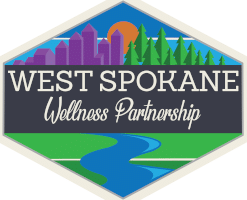About Our Coordinator
Sarah McNew is the current coalition coordinator for West Spokane Wellness Partnership. Sarah has a background in Social Work, holding a Masters of Social Work Degree with minors and certifications in disability, addiction, and suicide prevention and intervention. Sarah has been a community coalition coordinator since 2017 and has worked closely with the Spokane Tribe of Indians and now the West Spokane community.
The coalition coordinator has a very important role in the ongoing development of the coalition and implementation of the coalition’s strategic plan. It is the coordinators job to help organize and maintain the coalition and guide them through development, implementation, and evaluation of strategic and action plans. The coordinator is a resource in volunteer management, community organization, and prevention science.
Specific coordinator tasks include:
• Serving as staff for the coalition to plan, implement, and report;
• Coordinating regular meetings of the coalition and subcommittees/workgroups to ensure implementation of the strategic and action plans;
• Helping recruit and retain membership on coalition and support from local key leaders;
• Providing and/or coordinating training for coalition members on topics including the Strategic Prevention Framework, prevention science, cultural competency, reducing health disparities, environmental strategies;
• Coordinating the regular review of coalition budget by coalition members;
• Working with individual member organizations to help align and integrate their work with goals and strategies of the coalition;
• Serving as a liaison between coalition and DBHR; and
• Participating in Prevention Provider Learning Community meetings, monthly check-in meetings with DBHR manager, and trainings.


